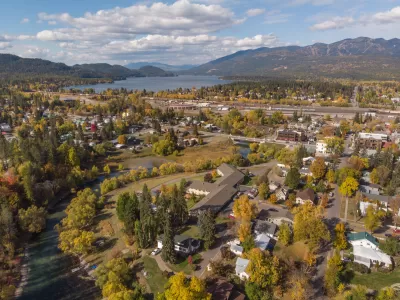The decision reverses new laws once dubbed the ‘Montana Miracle.’

A Montana judge reversed parts of a sweeping zoning reform package passed last year which would have legalized accessory dwelling units and duplexes in residential areas. According to the judge, the laws would “likely do ‘irreparable’ damage to residents of single-family neighborhoods.” Writing in Reason, Christian Britschgi calls the decision ‘eyebrow-raising,’ noting that “the reforms rank as some of the more ambitious housing bills passed by any state legislature last year.”
The decision is the result of a lawsuit brought by a group calling themselves Montanans Against Irresponsible Densification (MAID), which sued the state arguing that the zoning reforms were unconstitutional because they allowed neighborhoods with restrictive covenants to continue excluding denser housing types. “MAID said this would unfairly funnel development into areas without protective covenants, and produce arbitrary results whereby duplexes could be built on one side of a street, but not on the other side.”
This reversal of recent zoning reforms isn’t unique to Montana: “In September 2023, a Minnesota judge overturned Minneapolis' first-in-the-nation abolition of single-family-only zoning (in addition to other zoning reforms), citing the city's failure to conduct a proper state-required environmental analysis of increased allowable density,” and a Texas judge similarly invalidated zoning reforms in Austin.
With more Americans unable to afford housing, evictions on the rise, and housing supplies not meeting demand in many regions, the zoning reform and missing middle housing’ debate isn’t going anywhere soon.
FULL STORY: Court's Wild Zoning Decision Blocks 'Montana Miracle'

Maui's Vacation Rental Debate Turns Ugly
Verbal attacks, misinformation campaigns and fistfights plague a high-stakes debate to convert thousands of vacation rentals into long-term housing.

Planetizen Federal Action Tracker
A weekly monitor of how Trump’s orders and actions are impacting planners and planning in America.

In Urban Planning, AI Prompting Could be the New Design Thinking
Creativity has long been key to great urban design. What if we see AI as our new creative partner?

King County Supportive Housing Program Offers Hope for Unhoused Residents
The county is taking a ‘Housing First’ approach that prioritizes getting people into housing, then offering wraparound supportive services.

Researchers Use AI to Get Clearer Picture of US Housing
Analysts are using artificial intelligence to supercharge their research by allowing them to comb through data faster. Though these AI tools can be error prone, they save time and housing researchers are optimistic about the future.

Making Shared Micromobility More Inclusive
Cities and shared mobility system operators can do more to include people with disabilities in planning and operations, per a new report.
Urban Design for Planners 1: Software Tools
This six-course series explores essential urban design concepts using open source software and equips planners with the tools they need to participate fully in the urban design process.
Planning for Universal Design
Learn the tools for implementing Universal Design in planning regulations.
planning NEXT
Appalachian Highlands Housing Partners
Mpact (founded as Rail~Volution)
City of Camden Redevelopment Agency
City of Astoria
City of Portland
City of Laramie





























